October 25, 2014
Study Shows Growing Number of Young Japanese Urbanites Want to Settle in Rural Areas
Keywords: Population Decline
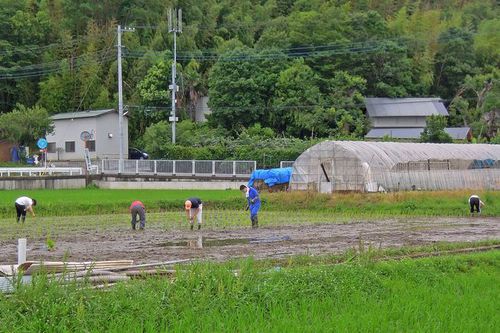
Image by Toshihiro Gamo Some Rights Reserved.
Japan is one of the first countries in the world to face, head-on, the serious issues of depopulation and an aging society. We introduce here the results of a public opinion poll on the changing attitudes of Japanese urban youth, which perhaps could point to a resolution of the problem of population over-concentration in the Tokyo Metropolitan area (outlined previously in an article in the June 2014 issue of the JFS Newsletter, titled "Depopulation of Society: Debate in Japan, One of the World's First Countries to Face the Issues").
According to the Statistics Bureau of Japan's Ministry of Internal Affairs and Communications, in its report published April 15, 2014, Japan's total population (as of October 1, 2013) was 127,298,000 people, with 13.3 million of them living in Tokyo and accounting for 10.4% of the total population, meaning that one out of every ten people in Japan lives in Tokyo.
While Japan has experienced three consecutive years of declining total population, it's important to note that when looked at by prefecture, although population declined in 39 prefectures, it actually increased in eight. The population of the Tokyo Metropolitan area this year grew by 0.53%, the highest among all prefectures and at a rate higher than last year, so it appears that population over-concentration will continue in Tokyo despite Japan's overall declining total population trend.
The relationship between Tokyo's overconcentration of population and the depopulation of rural areas has been an open question for some time, and there are growing concerns about how to overcome this trend in order to build a more sustainable country. The results of a survey, titled "Public Opinion Survey on the Rural Areas," released by the Cabinet Office of Japan on August 9, 2014, revealed some interesting findings.
It targeted 3,000 men and women, and found that about 31.6% of respondents who live in an "urban area" or "kind of urban area" have a yearning to resettle in a rural area, an increase from 20.6% in the previous survey, conducted in November 2005.
In terms of gender differences, more men than women expressed a desire to settle in a rural area. Broken down by age group, 38.7% of respondents in their twenties wanted to move to a rural area, followed by those in their forties (35.5%) and sixties (33.7%). The fact that nearly 40% of Japanese in their twenties want to live in a rural area may be a sign of changes in the future of Japan.
When asked what it would take for them to move to a rural area, the answers that ranked highest were availability of health care facilities, at 68.0%, and job availability to sustain their livelihood, at 61.6%.
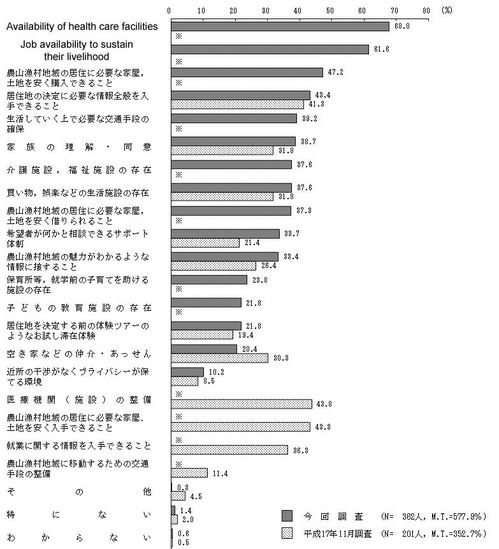
(Click the graph for a larger image)
Source: Public Opinion Survey on the Rural Areas, the Cabinet Office of Japan, 2014
On the other hand, 700 respondents living in rural or semi-rural areas were asked how they feel about people moving in from the cities. The results showed 85.3% in favor, which was higher than the 65.7% in the previous survey. This increase indicates that on the "receiving end," the rural dwellers have become more favorable to urbanites moving into their areas.
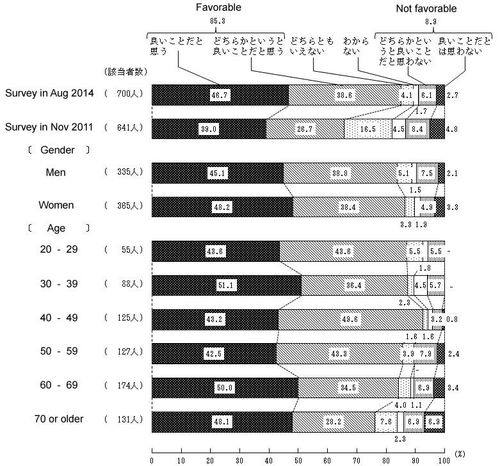
(Click the graph for a larger image)
Source: Public Opinion Survey on the Rural Areas, the Cabinet Office of Japan, 2014
When asked what might hinder new-comers from settling in rural areas, 63.0% cited a lack of jobs to establish their livelihoods, which had been 54.0% in the previous survey.
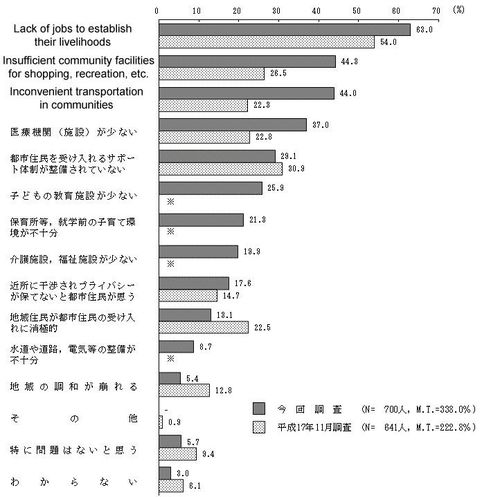
(Click the graph for a larger image)
Source: Public Opinion Survey on the Rural Areas, the Cabinet Office of Japan, 2014
The rural and semi-rural residents were also asked what they thought were problems with living in rural areas, and 32.7%, the largest percentage, answered "lack of jobs." These findings suggest that job creation would be the key both for rural residents to stay in the area and urbanites to move there.
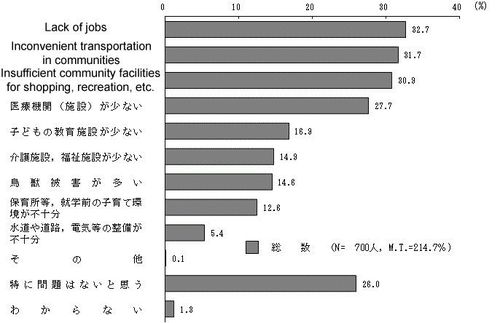
(Click the graph for a larger image)
Source: Public Opinion Survey on the Rural Areas, the Cabinet Office of Japan, 2014
We're looking at approaches and measures to tackle this issue, which I would like to discuss in later articles, so stay tuned!
Junko Edahiro
Related
"JFS Newsletter"
- The Zero-to-One Village Revitalization Movement in Chizu Town, Tottori Prefecture
- Villagers Use Hand-Made Canals and Their Own Money to Generate Micro-Hydropower
- Japan's Depopulating Society: Population Concentration in Tokyo and the Disappearance of Local Municipalities (Part 2)
- Japan's Depopulating Society: Population Concentration in Tokyo and the Disappearance of Local Municipalities (Part 1)
- The 'Era of Turbulence' and Japan's Paths to the Future


